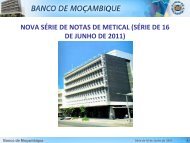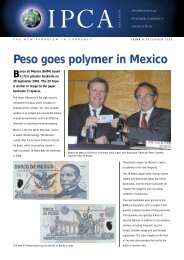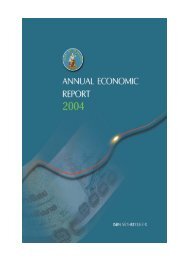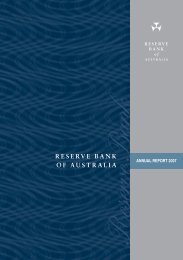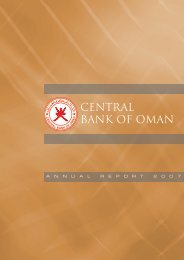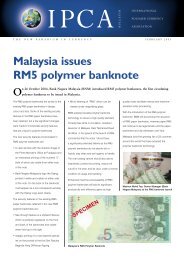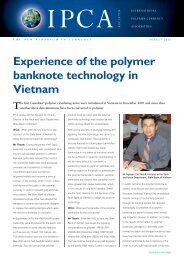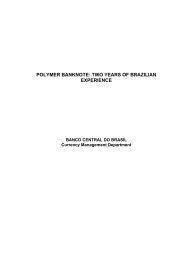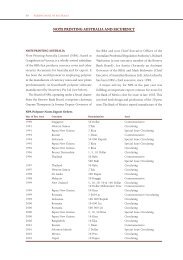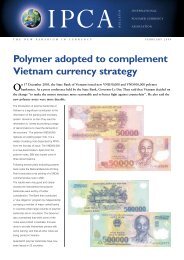ANNUAL REPORT 2008 - Polymer Bank Notes of the World
ANNUAL REPORT 2008 - Polymer Bank Notes of the World
ANNUAL REPORT 2008 - Polymer Bank Notes of the World
You also want an ePaper? Increase the reach of your titles
YUMPU automatically turns print PDFs into web optimized ePapers that Google loves.
The Eurosystem/ESCB committees havecontinued to play an important role in assisting<strong>the</strong> ECB’s decision-making bodies in <strong>the</strong>performance <strong>of</strong> <strong>the</strong>ir tasks. At <strong>the</strong> request <strong>of</strong>both <strong>the</strong> Governing Council and <strong>the</strong> ExecutiveBoard, <strong>the</strong> committees have providedexpertise in <strong>the</strong>ir fields <strong>of</strong> competence andhave facilitated <strong>the</strong> decision-making process.Membership <strong>of</strong> <strong>the</strong> committees is usuallyrestricted to staff <strong>of</strong> <strong>the</strong> Eurosystem centralbanks. However, <strong>the</strong> NCBs <strong>of</strong> <strong>the</strong> MemberStates which have not yet adopted <strong>the</strong> eurotake part in <strong>the</strong> meetings <strong>of</strong> a committeewhenever it deals with matters that fall within<strong>the</strong> field <strong>of</strong> competence <strong>of</strong> <strong>the</strong> General Council.Where appropriate, o<strong>the</strong>r competent bodies,such as national supervisory authorities in <strong>the</strong>case <strong>of</strong> <strong>the</strong> <strong>Bank</strong>ing Supervision Committee,may also be invited. As at 31 December <strong>2008</strong>,13 Eurosystem/ESCB committees had beenestablished under Article 9.1 <strong>of</strong> <strong>the</strong> Rules <strong>of</strong>Procedure <strong>of</strong> <strong>the</strong> ECB.The Budget Committee, which was establishedunder Article 15 <strong>of</strong> <strong>the</strong> Rules <strong>of</strong> Procedure,assists <strong>the</strong> Governing Council in matters relatedto <strong>the</strong> ECB’s budget.The Human Resources Conference wasestablished in 2005 under Article 9a <strong>of</strong> <strong>the</strong>Rules <strong>of</strong> Procedure as a forum for <strong>the</strong> exchange<strong>of</strong> experience, expertise and information amongEurosystem/ESCB central banks in <strong>the</strong> field <strong>of</strong>human resources management.In line with <strong>the</strong> Eurosystem mission statementand <strong>the</strong> organisational principles, which state<strong>the</strong> aim <strong>of</strong> exploiting synergies within <strong>the</strong>Eurosystem and achieving cost-efficiency gainsthrough economies <strong>of</strong> scale, <strong>the</strong> GoverningCouncil established <strong>the</strong> Eurosystem IT SteeringCommittee (EISC) in August 2007, with amandate to steer continuous improvement in <strong>the</strong>use <strong>of</strong> IT within <strong>the</strong> Eurosystem. The EISC’sresponsibilities relate in particular to EurosystemIT governance, and it aims to increase <strong>the</strong>efficiency and effectiveness <strong>of</strong> <strong>the</strong> GoverningCouncil’s decision-making on Eurosystem/ESCBIT projects and operations. The EISC, composed<strong>of</strong> one member per Eurosystem central bank,reports to <strong>the</strong> Governing Council via <strong>the</strong>Executive Board.1.6 CORPORATE GOVERNANCEIn addition to <strong>the</strong> decision-making bodies, <strong>the</strong>corporate governance <strong>of</strong> <strong>the</strong> ECB encompassesa number <strong>of</strong> external and internal controllayers, three codes <strong>of</strong> conduct as well as rulesconcerning public access to ECB documents.EXTERNAL CONTROL LAYERSThe Statute <strong>of</strong> <strong>the</strong> ESCB provides for two layers,namely <strong>the</strong> external auditor, which is appointedto audit <strong>the</strong> annual accounts <strong>of</strong> <strong>the</strong> ECB(Article 27.1 <strong>of</strong> <strong>the</strong> Statute <strong>of</strong> <strong>the</strong> ESCB), and <strong>the</strong>European Court <strong>of</strong> Auditors, which examines <strong>the</strong>operational efficiency <strong>of</strong> <strong>the</strong> management <strong>of</strong> <strong>the</strong>ECB (Article 27.2). The annual report <strong>of</strong> <strong>the</strong>European Court <strong>of</strong> Auditors, toge<strong>the</strong>r with <strong>the</strong>ECB’s reply, is published on <strong>the</strong> ECB’s websiteand in <strong>the</strong> Official Journal <strong>of</strong> <strong>the</strong> European Union.In order to reinforce public assurance as to <strong>the</strong>independence <strong>of</strong> <strong>the</strong> ECB’s external auditor,<strong>the</strong> principle <strong>of</strong> audit firm rotationis applied. 8 In <strong>2008</strong>, in <strong>the</strong> context <strong>of</strong> <strong>the</strong>Governing Council’s statutory task <strong>of</strong> makingrecommendations to <strong>the</strong> EU Council on <strong>the</strong>appointment <strong>of</strong> external auditors for <strong>the</strong> centralbanks <strong>of</strong> <strong>the</strong> ESCB, as provided for underArticle 27.1 <strong>of</strong> <strong>the</strong> Statute <strong>of</strong> <strong>the</strong> ESCB, <strong>the</strong>Governing Council approved “Good practices for<strong>the</strong> selection and mandate <strong>of</strong> External Auditors”,which were published on <strong>the</strong> ECB’s website.These good practices, which provide high-levelguidance for each Eurosystem central bank whenselecting external auditors and determining <strong>the</strong>irmandate <strong>the</strong>reafter, enable <strong>the</strong> Governing Councilto formulate its recommendations to <strong>the</strong> EUCouncil on <strong>the</strong> basis <strong>of</strong> harmonised, consistentand transparent selection criteria.8 KPMG Deutsche Treuhand-Gesellschaft AG Wirtschaftsprüfungsgesellschaftwas <strong>the</strong> ECB’s external auditor for <strong>the</strong>financial years 2003-07. Following <strong>the</strong> conclusion <strong>of</strong> a tenderprocedure and in line with <strong>the</strong> agreed practice <strong>of</strong> rotatingaudit firms, PricewaterhouseCoopers AktiengesellschaftWirtschaftsprüfungsgesellschaft was appointed as <strong>the</strong> ECB’sexternal auditor for <strong>the</strong> financial years <strong>2008</strong>-12.204 ECBAnnual Report<strong>2008</strong>



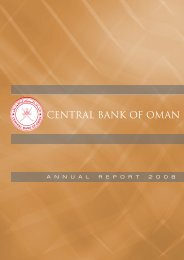
![KNOW YOUR NEW GIBRALTAR BANKNOTES - [Home] bThe/b](https://img.yumpu.com/50890985/1/184x260/know-your-new-gibraltar-banknotes-home-bthe-b.jpg?quality=85)
![PAPUA NEW GUINEA - [Home] - Polymer Bank Notes of the World](https://img.yumpu.com/49758743/1/190x143/papua-new-guinea-home-polymer-bank-notes-of-the-world.jpg?quality=85)

